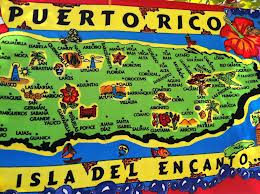November 25, 2013
By: Kelly Diamond, Publisher

The point is: there is no one singular solution to anything. So even the idea of expatriating to get away from American tyranny, comes with trade-offs. Wherever you go, the point is to maximize freedom. Maximize your lifestyle, your earning potential, your wealth retention, and your overall privacy. Is there a perfect place? No. Are there better places than others for your goals? You bet!
There are studies that indicate countries like Chile, Australia, and Hong Kong are far more economically free than the United States. Bobby recently wrote about some awesome economic advantages in Singapore. Bobby lives in Latvia, and is completing the process of getting a second passport and citizenship in Italy. It all depends on your goal(s).
Here is yet another option for you to consider: Puerto Rico. There are trade-offs, as with everything, but there are some considerable benefits that, depending on your circumstances, might make a lot of sense.
Large corporations already benefit from a law passed about a year ago “cutting its capital-gains tax rate to zero for investments made by new residents, effective through 2035 (and dramatically cutting the tax rate for businesses they start there, too, to 4 percent). The 0 percent rate will only apply to gains made after residents move to the island, but existing unrealized capital gains for commonwealth residents will be taxed at PR’s existing rate, which is just 10 percent, versus 23.8 percent in the U.S. (up from 15 percent last year).” (Source: National Review)
For example, Microsoft has saved $4.5 billion over three years just by routing some of their earnings through Puerto Rico. Okay, you’re not Bill Gates, but you can see how their corporate tax structure can be a boon for some. That’s just the money he saves from paying a 4% Puerto Rican corporate tax as opposed to the 35% US corporate tax on just SOME of his business.
There are also benefits for individuals. The short version is, you get the tax breaks of an expat without the costs and penalties of actually abandoning your American citizenship. One of the big motivations behind expatriation is the fact that the United States taxes it citizens no matter where they earn. Unfortunately, those that live abroad, are bound by local taxes of their country of residence as well as their country of citizenship. We are the only country in the developed world that does this to its citizens.
A Puerto Rican resident is exempt from short and long term capital gains taxes in both Puerto Rico and the United States.
Eligibility for Puerto Rican residency requires you spend a minimum of 183 days there, as well as having social or personal connections on the island. It sounds like an exclusive golf club, but personal connections could very well include real estate.
Puerto Rico is what I would call a “hybrid” territory of the US. It’s not a state, but it’s not its own country either. It’s subject to payroll/FICA taxes, but not federal income taxes. It has its own income tax code. That code exempts its residents from paying US federal income taxes on income earned in Puerto Rico. This is a sweeter deal than just having an offshore bank account which is subject to the various filings such as the FBAR.
There are some trade-offs, as I mentioned earlier. Residents have to spend at least 183 days per year in Puerto Rico per year. The well-to-do should at least be aware of the criminal element. It has a population of 4 million… packed into a geography that is smaller than the state of Connecticut. It has a high violent crime rate.
There are also some cynics out there. Cynics with good reason to be! You and I understand why Puerto Rico is being so aggressive in its tax reforms: to draw in the wealth. So a millionaire or billionaire living in the US is worth 39% in marginal tax rate… maybe 20% in effective tax rate? Well, any percentage from a million/billionaire for Puerto Rico is more than what they had before. So 10% of wealth they never had in the country is a thrill! But that means 0% to the US. And that’s not okay.
Remember back when I suggested South American countries offer an open call to all disenfranchised Americans with an easy path to residency or citizenship to get their wealth and productive ethic in their borders? Okay, well, here’s the potential down side to that: the USSA gets angry. And what does an angry America do? It starts to leverage its might and flex its fiscal muscles. Now, most of South America could probably afford to tell the US to sod off. In fact, Ecuador is fine to do just that… and could likely get more from a friendly offer like Puerto Rico than any foreign aid.
Puerto Rico, on the other hand, is economically suffering. It gets $22 BILLION in subsidies and aid from the US. That’s 25% of their GDP. Can they make THAT back in billionaires without and before buckling under the financial pressure of the US?
The cynics will say that while things look good now, Puerto Rico will not be able to sustain these tax friendly waters as long as they claim. But what did I say at the very beginning? There is no ONE silver bullet. There are just a lot of different options, and diversification is the key to success.
Whatever the risks are, large pharmaceutical corporations like Amgen and Pfizer along with the likes of Microsoft seem to find the advantages are worth it. There are the likes of John Paulson who are sincerely looking at it as a viable option… with ten other similarly financially situated individuals. It’s worth learning the finer points for those who need to stay connected to the United States, but would like the tax benefits of expatriation.




